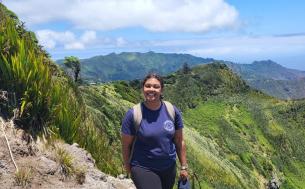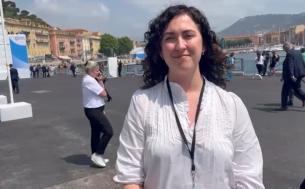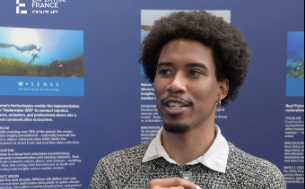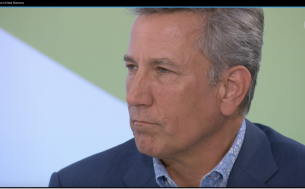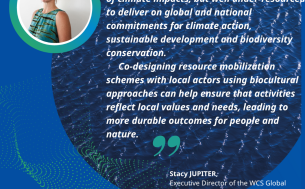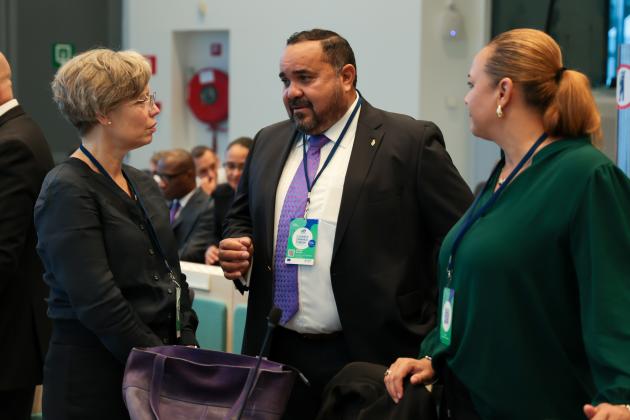
Publié le 09/10/2024, mis à jour le 14/11/2024
Day 2 : GO Climate Finance Forum: Climate finance in practice
-
The first day of the GO Climate Finance Forum (CFF) brought together 146 participants, including experts, policymakers, and representatives from Overseas Countries and Territories (OCTs) and Small Island Developing States (SIDS) to discuss solutions to the climate challenges they are particularly exposed to. Four key sessions shaped this first day, covering topics ranging from territorial protection to access to climate finance, and innovative adaptation strategies. Here's an overview of each session and the highlights of the day.
-

Session 1: OCTs facing climate challenges
The first session highlighted the climate urgency faced by European and British OCTs. Félix Fernandez-Shaw, representing the European Union, emphasized the importance of these territories for global biodiversity protection, while also underscoring their vulnerability to natural disasters like hurricanes and floods. Dr. Tasha Ebanks Garcia, representing the Cayman Islands, reminded the audience that OCTs play a vital role in biodiversity conservation, representing 90% of the UK's biodiversity. However, these territories are on the front lines of the climate crisis, with temperatures expected to rise by 2 to 3°C by 2100. Her message was clear: while the 25 OCTs are different in historical and cultural terms, they are all stewards of unique territories and are on the front lines of climate change.
Emily Wilkinson, Ahab Downer, Juan E. Thijsen, Isabelle Richard, and Ignacio Ybáñez also contributed to this first session.
-
Session 2: Overcoming challenges in accessing climate finance
The second session shed light on the specific challenges OCTs face in accessing climate finance. Jérémie Katidjo-Monnier, Minister of Environment and Ecological Transition of New Caledonia, discussed the financing initiatives available for the territory, while highlighting the administrative hurdles and complex eligibility criteria that hinder access to these funds. Despite the availability of many financing options, the lack of coordination and administrative burden slows down their usage.
Julien Fouilland, Climate Change Adaptation Managing Consultant, presented a study on access to funds for OCTs. This was followed by an expert debate on financing access.
For the UN, most OCTs are not classified as Small Island Developing States, developing countries, or even states. The panel discussions emphasized the need for OCTs to find innovative ways to access climate finance despite the challenges posed by their status. This requires well-established policies tailored to the islands' specific needs. In parallel, preparation for adaptation, particularly through public awareness and proactive management of funds before disasters strike, is crucial. A key point raised was the need to strengthen local human capacities, as highlighted by Manon Marcadet, Climate finance advisor (CFAN) for the Government of French polynesia, Ministry of Economy, Budget and Finance in charge of Energy.
Bianca Peters, Luc Clerveaux, Louis Pâris, Manon Marcadet, and Emily Wilkinson also contributed to the discussion.
-
Session 3: Innovating for a green transition
In the third session, discussions focused on innovations for a sustainable energy transition. Walter Roban, Deputy Premier and Minister of Home Affairs of Bermuda, presented the expansion of renewable energies as a key development pathway, particularly through the electrification of transport and solar projects.
During the roundtables, Jason Cotton from the Caribbean Development Bank (CDB) stressed the importance of strategic partnerships and co-financing to reduce private transaction risks. He also mentioned a feasibility study on MSMEs (micro-, small- and medium-sized enterprises) to better understand their difficulties in accessing finance and develop instruments to overcome these barriers. Simon Dent from Outrigger Impact emphasized that the blue economy represents the next major economic opportunity. He presented governance models and the six key investment sectors to target. Roberto Estélles Colom from the EU INTPA B3 highlighted the experience of partnerships in Greenland, which can be replicated in other OCTs. This involves mobilizing all stakeholders: public and private, investors, construction companies, etc. Denis Ehrsam from Wallis and Futuna stressed the need for a minimum fund allocation per country and the importance of creating preparation conditions and developing mutual trust.
Rebecca Stringer and Paul Sayers also actively contributed to the discussions.
-
Session 4: Strengthening the financial resilience of island territories
The final session addressed financial resilience strategies to cope with climate risks. Warren Dexter, Minister of Economy and Finance, Government of French Polynesia, highlighted Polynesia's efforts to green its budget and integrate environmental criteria into all financial decisions. He reminded the audience that these territories, among the most vulnerable to climate disasters, must adapt their financial systems to ensure long-term resilience. Other contributions, such as that of Drexel M. Glasgow, Director of Projects, Deputy Financial Secretary, Ministry of Finance, Government of the British Virgin Islands, demonstrated that access to adaptation financing remains a challenge, but it is crucial for rebuilding after major climate disasters.
Mary Elinor Boyer, Carlos Sanchez, Rosamund Edwards, John Ward, and Kalistat Lund also contributed to the discussions during this fourth session.
This first day of the GO Climate Finance Forum shed light on the immense challenges that OCTs must face in the context of the climate crisis. The discussions allowed the articulation of key issues for improving access to finance, strengthening financial resilience, and fostering innovation. This forum marks a turning point in how these territories can collectively tackle climate challenges and secure sustainable solutions for the future.


